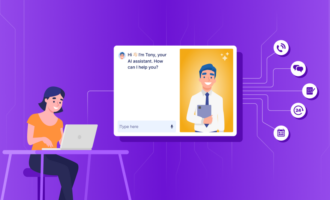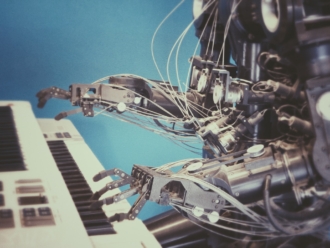Key Takeaways
- AI assistants help with tasks like scheduling and answering questions but require human input.
- AI agents operate autonomously, learning from past interactions and making independent decisions.
- AI assistants focus on user interaction, while AI agents execute complex, goal-oriented tasks.
- AI agents handle dynamic processes like logistics, finance, and customer service automation.
- Jotform AI Agents transform forms into interactive experiences, automating customer interactions without coding.
Are you considering implementing artificial intelligence technology in your business but unsure about what kind of tool to use? There are many different types of AI technology that can support business operations, customer requests, organizational decision-making, and more.
Differentiating between them can be confusing. AI assistants and AI agents are two similar but distinct types of AI tools. You may not know exactly what each tool does, but it’s likely you’ve interacted with at least one of them before.
In this article, we compare the function and purpose of AI assistants to AI agents so you have a clear understanding of each tool and what it can do. We also show you the key differences between each tool to help you determine which one may be right for your needs.
Plus, we introduce you to Jotform AI Agents, a helpful and easy-to-use AI tool that can support a number of tasks in your organization.
Build Your Custom AI Agent in Minutes
Get Started NowAI assistant vs AI agents
AI assistants and AI agents sound similar, but they actually perform very different roles.
“AI assistants are like helpful sidekicks,” says Amit Dixit, the chief technology officer at Zolostays, a platform for discovering and booking co-living solutions. “They’re great at assisting with tasks when you need a bit of support. They respond to commands, answer questions, and make recommendations, but they usually need a human to give the final thumbs up. Think of them as a smart email autocomplete or a virtual assistant that helps you organize your day.”
Microsoft Copilot and Google Gemini are examples of AI assistants you may be familiar with.
AI agents, on the other hand, are autonomous and act without needing human interaction at every stage. “They don’t just wait for you to tell them what to do; they figure things out and act on their own,” says Dixit.
“At Zolostays, we’ve developed our own AI chatbot that’s more of an agent than an assistant. This chatbot doesn’t just answer customer questions; it also suggests properties based on what it learns from the user, without needing human approval at every step.”
Pro Tip
Boost your customer support efficiency with the AI phone answering system by automating calls and providing instant responses.
What’s the difference between AI agents and AI assistants?
If you’re trying to decide whether to use an AI assistant or an agent, here are some important things to consider.
Autonomy vs assistance
AI agents have far more autonomy than AI assistants. AI agents can learn from their past experiences and environment, whereas many types of AI assistants can’t.
“An AI assistant is typically designed to perform tasks that are more direct and user-facing, like scheduling appointments, answering questions, or managing emails,” says Dhanvin Sriram, an AI expert and the founder of PromptVibes, an AI tool for generating ChatGPT prompts. “AI assistants focus on helping users with routine tasks and enhancing productivity.”
By contrast, AI agents are intended to handle tasks independently, without needing human approval at every stage of a process. Imagine an AI agent for a hotel, for example, that could answer customer questions, schedule housekeeping requests, handle maintenance appointments, oversee room bookings, calculate dynamic pricing, and more, all without a human employee being involved.
Functionality and scope
AI agents often perform specific tasks within a set domain or environment, like a self-serve employee FAQ system or a logistics tool for ordering inventory. “AI agents are built to make decisions, execute complex tasks, and even interact with other systems without needing constant human input,” says Sriram. “For example, an AI agent could analyze large datasets, predict trends, or even trade stocks based on certain parameters.”
AI assistants, on the other hand, are designed to assist the user with day-to-day tasks rather than acting independently.
Interaction complexity
AI agents typically handle more complex, context-driven conversations compared to the more transactional interactions managed by AI assistants.
“AI agents are often used in finance for things like algorithmic trading, where they can make split-second decisions based on market data,” says Sriram. “In logistics, AI agents can optimize delivery routes or manage supply chains by predicting demand.”
AI assistants handle simpler queries, such as scheduling, sending automated reminders, or controlling smart home devices.
AI assistant vs agent comparison table
| AI assistant | AI agent | |
|---|---|---|
| Primary function | Retrieves information and performs simple workflow tasks based on human prompts | Uses autonomous decision-making and data analysis to achieve a goal |
| Level of autonomy | Has limited autonomy but can only make decisions based on predefined rules | Has autonomy to make decisions and act on them in order to complete tasks and achieve objectives |
| Functionality and scope | Can streamline day-to-day tasks, act on human prompts, and automate workflows | Can make decisions, analyze vast amounts of data, and act without human oversight |
| Ability to interact | Can use voice and text to interact with users and receive prompts | Can interact with humans if needed but often interacts with other software systems |
| User interface | Features a user-friendly interface | Has a complex interface certain individuals use only when necessary |
How can Jotform AI Agents help your business?
If your organization has many forms-based processes for customers and employees, Jotform’s AI Agent may be the right choice for you.
Jotform AI Agents can help you transform online forms into dynamic, conversational experiences without needing to write any code. These complex AI agents are trained with the data you provide, and they learn to ask questions and answer your customers’ queries — saving you time, energy, and money.
You can build an AI agent easily. You can automatically make an agent from an existing form, create an agent from scratch, or use Jotform’s agent directory for a quick start. You can train the agent with relevant documents and information, customize it using the Agent Builder, and launch it.
Using Jotform AI Agents is an excellent way to dip your toe in the AI waters — and make your customer interactions more efficient, intuitive, and engaging.
Photo by Gustavo Fring


























































Send Comment: